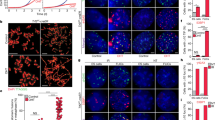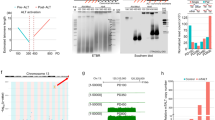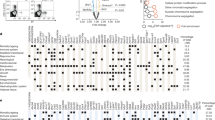Abstract
Msh2 is a key mammalian DNA mismatch repair (MMR) gene and mutations or deficiencies in mammalian Msh2 gene result in microsatellite instability (MSI+) and the development of cancer. Here, we report that primary mouse embryonic fibroblasts (MEFs) deficient in the murine MMR gene Msh2 (Msh2−/−) showed a significant increase in chromosome aneuploidy, centrosome amplification, and defective mitotic spindle organization and unequal chromosome segregation. Although Msh2−/− mouse tissues or primary MEFs had no apparent change in telomerase activity, telomere length, or recombination at telomeres, Msh2−/− MEFs showed an increase in chromosome end-to-end fusions or chromosome ends without detectable telomeric DNA. These data suggest that MSH2 helps to maintain genomic stability through the regulation of the centrosome and normal telomere capping in vivo and that defects in MMR can contribute to oncogenesis through multiple pathways.
This is a preview of subscription content, access via your institution
Access options
Subscribe to this journal
Receive 50 print issues and online access
$259.00 per year
only $5.18 per issue
Buy this article
- Purchase on Springer Link
- Instant access to full article PDF
Prices may be subject to local taxes which are calculated during checkout




Similar content being viewed by others
References
Artandi SE, DePinho RA . (2000). Curr Opin Genet Dev 10: 39–46.
Bailey SM, Brenneman MA, Goodwin EH . (2004). Nucleic Acids Res 32: 3743–3751.
Bechter OE, Zou Y, Walker W, Wright WE, Shay JW . (2004). Cancer Res 64: 3444–3451.
Bellacosa A . (2001). Cell Death Differ 8: 1076–1092.
Buermeyer AB, Deschenes SM, Baker SM, Liskay RM . (1999). Annu Rev Genet 33: 533–564.
de Lange T . (2002). Oncogene 21: 532–540.
de Wind N, Dekker M, Berns A, Radman M, te Riele H . (1995). Cell 82: 321–330.
Doxsey S, Zimmerman W, Mikule K . (2005). Trends Cell Biol 15: 303–311.
Edelmann W, Yang K, Umar A, Heyer J, Lau K, Fan K et al. (1997). Cell 91: 467–477.
Ghadimi BM, Sackett DL, Difilippantonio MJ, Schrock E, Neumann T, Jauho A, Auer G et al. (2000). Genes Chromosomes Cancer 27: 183–190.
Greider CW . (1998). Proc Natl Acad Sci USA 95: 90–92.
Kim NW, Wu F . (1997). Nucleic Acids Res 25: 2595–2597.
Nigg EA . (2002). Nat Rev Cancer 2: 815–825.
Pickett HA, Baird DM, Hoff-Olsen P, Meling GI, Rognum TO, Shaw J et al. (2004). Oncogene 23: 3434–3443.
Prolla TA, Baker SM, Harris AC, Tsao JL, Yao X, Bronner CE et al. (1998). Nat Genet 18: 276–279.
Reitmair A, Schmits R, Ewel A, Bapat B, Redston M, Mitri A et al. (1995). Nat Genet 11: 64–70.
Rizki A, Lundblad V . (2001). Nature 411: 713–716.
Rufer N, Dragowska W, Thornbury G, Roosnek E, Lansdorp PM . (1998). Nat Biotechnol 16: 743–747.
Saunders W . (2005). Semin Cancer Biol 15: 25–32.
Zijlmans JM, Martens UM, Poon SS, Raap AK, Tanke HJ, Ward RK, Lansdorp PM . (1997). Proc Natl Acad Sci USA 94: 7423–7428.
Acknowledgements
We acknowledge the support of the office of Biological and Environmental Research, US Department of Energy under Contract DE-AC056-960R22464 with UT-Battelle, LLC. MRC is supported by Alberta Heritage Foundation for Medical Research (AHFMR) and Alberta Cancer Board studentships. SEA is a scholar of the AHFMR and the Canadian Genetic Diseases Network. We thank Ms. Cecilia Wang and Ms. Marla Gomez for assisting the image analysis of FISH.
Author information
Authors and Affiliations
Corresponding author
Additional information
Supplementary Information accompanies the paper on the Oncogene website (http://www.nature.com/onc)
Supplementary information
Rights and permissions
About this article
Cite this article
Campbell, M., Wang, Y., Andrew, S. et al. Msh2 deficiency leads to chromosomal abnormalities, centrosome amplification, and telomere capping defect. Oncogene 25, 2531–2536 (2006). https://doi.org/10.1038/sj.onc.1209277
Received:
Revised:
Accepted:
Published:
Issue Date:
DOI: https://doi.org/10.1038/sj.onc.1209277
Keywords
This article is cited by
-
A genetic variant in telomerase reverse transcriptase (TERT) modifies cancer risk in Lynch syndrome patients harbouring pathogenic MSH2 variants
Scientific Reports (2021)
-
Atf3 deficiency promotes genome instability and spontaneous tumorigenesis in mice
Oncogene (2018)
-
Regulation of the hTERT promoter activity by MSH2, the hnRNPs K and D, and GRHL2 in human oral squamous cell carcinoma cells
Oncogene (2009)
-
Msh2 promoter region hypermethylation as a marker of aging-related deterioration in old retired female breeder mice
Biogerontology (2008)



